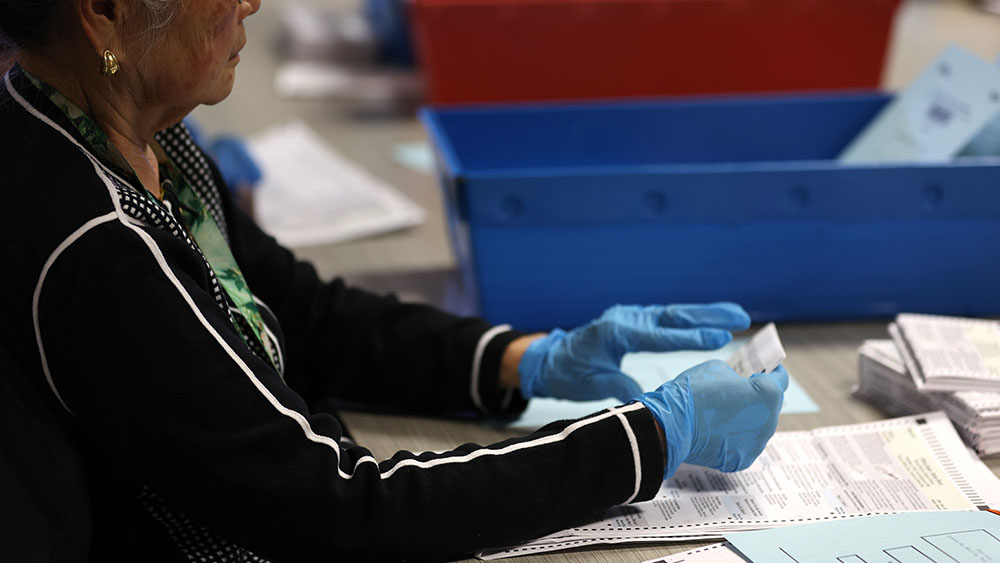U.S. states are passing internet age verification laws as a cover to compel people into using digital IDs
11/15/2024 / By Kevin Hughes

More and more nations are installing internet age verification systems for people who want to access adult content on the web under the guise of protecting children. However, experts are warning that online age verification systems may pave the way to the full implementation of digital IDs that can keep track of people’s online habits.
These laws that enforce online age verification for access to adult internet content are being considered as traps for the rolling out of complete content-based and personalized government control of internet access.
Critics and concerned citizens are now questioning how these internet age verification requirements will work and where they will begin.
“The current leading edge of attempts to legislate ID requirements for Internet access takes the form of laws requiring ‘age verification’ for access to ‘adult’ internet content,” noted Edward Hasbrouck, writing for Papers Please. “Trying to use age verification for adult web content as the basis for internet ID requirements is a national and international trend. Many U.S. states have enacted or are considering laws like this.”
These states have different processes for verifying the ages of people trying to access adult content. But in general, users will have to supply websites with digital personal identifiers, which is why internet privacy and free speech activists are concerned. They argue that age verification is in essence a digital ID.
Several states already requiring age verifications to access adult internet content
So far, 19 states have already passed age verification laws: Alabama, Arkansas, Florida, Georgia, Idaho, Indiana, Kansas, Louisiana, Mississippi, Montana, Nebraska, North Carolina, Oklahoma, South Carolina, Tennessee, Texas, Utah and Virginia. The latest and 19th state to pass this law was Kentucky back in early April.
Most of these internet age verification laws are already in effect. Three states – Florida, Georgia and Tennessee – have set implementation dates in January. (Related: Texas bills to mandate age verification for visitors of adult websites.)
Thirteen other states have introduced similar internet age verification bills that failed to pass in their respective legislatures – Alaska, California, Delaware, Illinois, Iowa, Minnesota, Missouri, New Hampshire, New Mexico, South Dakota, West Virginia, Wisconsin and Wyoming.
In some of these states, not enough legislators voted in favor of the bills and in others they were defeated by courts. In Arizona, a similar law was approved by the State Legislature but was then vetoed by Gov. Katie Hobbs.
In four states –Michigan, New Jersey, Ohio and Pennsylvania – similar internet age verification bills are still working their way through the state legislatures.
Only 13 states – Colorado, Connecticut, Hawaii, Maine, Maryland, Massachusetts, Nevada, New York, North Dakota, Oregon, Rhode Island, Vermont and Washington – have yet to introduce internet age verification laws.
A challenge to Texas’ law was taken up by the Supreme Court in the case of the Free Speech Coalition v. Paxton, lobbied against Texas Attorney General Ken Paxton regarding the state’s requirement that adult internet websites implement age verification systems to prevent access by minors. Oral arguments are scheduled for Jan. 15, 2025.
The potential impact of the case remains unclear. Even if the Texas law is revoked, state legislators have indicated they are ready to pass another age verification law acceptable to courts.
Follow Computing.news for more news about the internet age verification issue.
Watch the video below about why internet age verification laws are another nail in the coffin of privacy.
This video is from the unmasked channel on Brighteon.com.
More related stories:
UN “pact for the future:” Digital IDs, vaccine passports, massive censorship.
Indiana and Mississippi SUED over online age verification laws.
Say goodbye to your privacy: Use of digital IDs in American states is spreading rapidly.
Sources include:
Submit a correction >>
Tagged Under:
adult content, age verification, Big Brother, big government, computing, conspiracy, cyber war, Dangerous, deception, digital ID, freedom, Glitch, information technology, insanity, internet, Liberty, online content, Orwellian, privacy watch, surveillance
This article may contain statements that reflect the opinion of the author
RECENT NEWS & ARTICLES
COPYRIGHT © 2017 GLITCH.NEWS
All content posted on this site is protected under Free Speech. Glitch.news is not responsible for content written by contributing authors. The information on this site is provided for educational and entertainment purposes only. It is not intended as a substitute for professional advice of any kind. Glitch.news assumes no responsibility for the use or misuse of this material. All trademarks, registered trademarks and service marks mentioned on this site are the property of their respective owners.



















